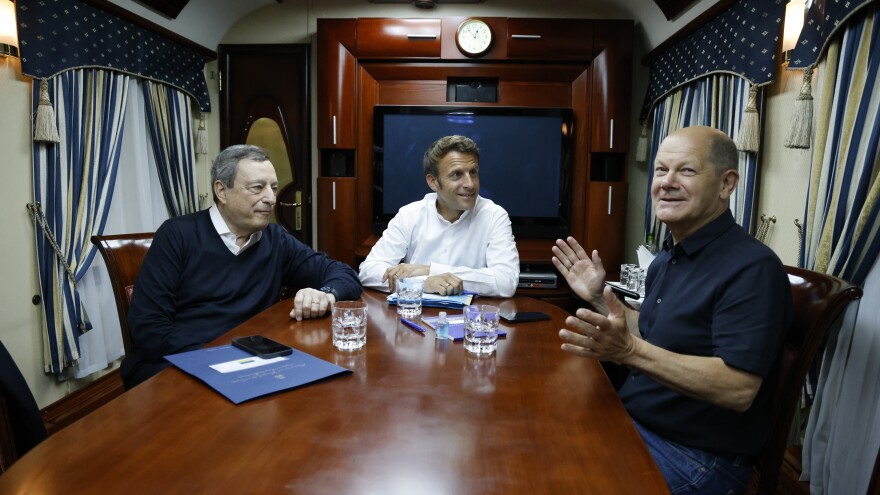Updated June 16, 2022 at 8:33 AM ET
KYIV, Ukraine — Four European leaders met Thursday with Ukraine's President Volodymyr Zelenskyy in talks intended as a show of unity for a country struggling to hold back the Russian military.
The leaders of France, Germany, Italy and Romania arrived in the capital Kyiv by train because Ukraine's civilian airports have been shut down by the war. Air raid sirens went off shortly after they arrived.
The leaders held talks with Zelenskyy at his heavily fortified compound on a hilltop overlooking the city. The Europeans also visited Irpin, a suburb of the capital where Russian troops were accused of widespread abuses in the early days of the war.
French President Emmanuel Macron said there were signs the Russians had carried out "massacres."
Ukrainians have criticized Macron for being too accommodating toward Russia. He has said Ukraine should considering conceding territory so Russia is not "humiliated."
But the French leader said his current trip was intended as "a message of European unity for the Ukrainian people, support now and in the future, because the weeks to come will be very difficult."
Macron shared a train ride into Kyiv with German Chancellor Olaf Scholz and Italian Prime Minister Mario Draghi. Romanian President Klaus Iohannis arrived on a separate train.
Next week, European Union leaders are expected to make a decision on Ukraine's request to become a candidate for membership in the EU.

Meanwhile, Zelenskyy welcomed the U.S. announcement Wednesday that it's sending an additional $1 billion in military aid that includes heavy weapons for the outgunned Ukrainian military.
"It's yet another sign that Western support for Ukraine is here for good," Zelenskyy said in his regular late-night address. "I'll keep asking for necessary weapons and equipment, but the bravery and skillfulness of our service members can't be imported."
Ukrainian leaders have criticized what they describe as lukewarm support from these key European countries, and Thursday's meeting is being closely watched to gauge the level of support for Ukraine's war with Russia.
Ukrainian leaders have also been upset with Scholz, the German leader, who has said Ukraine should not lose the war, but has not gone so far as to say it should win in its fight with Russia.
"How can the country that rapes our women be allowed save face?" Mykhailo Podolyak, a top adviser to Zelenskyy, told NPR in an interview this week. "What do we need to win this war, to have this war come to an end? We need weapons."
Podolyak is Ukraine's chief negotiator, and in the early weeks of the war he led a team that met several times with Russian representatives. But the talks made no progress. As evidence of Russian abuses mounted on the battlefield, the Ukrainian public turned against such talks.
In a poll last month, more than 80% of Ukrainians said they were unwilling to give up territory for peace, even if it means a prolonged conflict, according to the Kyiv International Institute of Sociology.

Podolyak said if Ukrainians cede territory to Russia now, even if under a temporary ceasefire, there are no guarantees Russia would not invade again later.
"A cease-fire would be a de facto Russian victory," he said. But, he added, "We are ready to agree to something so long as this [Russian] threat does not persist."
For now, Podolyak and other Ukrainian leaders say Ukraine desperately needs more artillery to combat the Russian forces that are making grinding progress in the eastern part of the country. After weeks of heavy fighting, the Russians are on the verge of capturing the city of Sievierodonetsk in the Donbas region.
Podolyak posted a wish-list of weapons on Twitter, which included requests for 1,000 howitzers, 1,000 drones and 500 tanks. He said this would give Ukraine "parity" with Russian forces.
He stressed that Ukraine is increasing dependent on Western weapons because it is running out of ammunition for its aging Soviet-era arsenal. Additional ammunition for those weapons is not widely available outside of Russia.
Ukraine has been transitioning to NATO equipment in recent years, but Podolyak says it takes European buy-in for Ukraine to fully transition to more modern systems which are made and sold worldwide.
But as long as the Russians have an advantage in artillery by a ratio of 10-to-1 or more, Ukraine will continue to struggle on the battlefield, he said.
Copyright 2022 NPR. To see more, visit https://www.npr.org.






